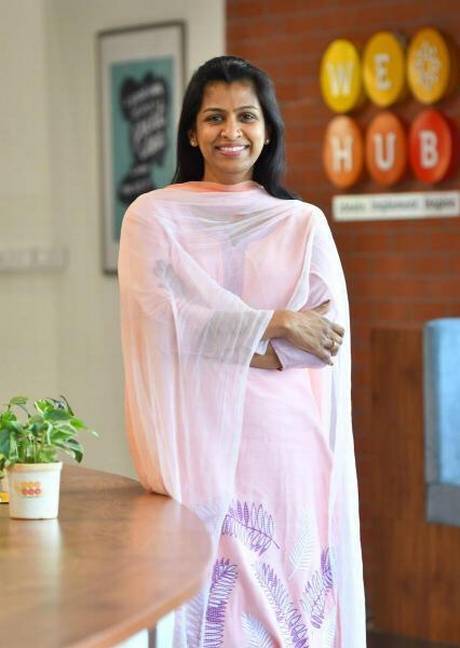Deepthi Ravula | Photo Credit: NAGARA GOPAL
WE Hub propels the startup vision of aspiring women entrepreneurs to the next level
It is a busy day at the WE Hub (Women Entrepreneurs Hub) office in the premises of Dr BR Ambedkar Open University in Jubilee Hills, Hyderabad. Serving as Telangana’s incubator for women entrepreneurs, WE Hub has a co-working space, a play area for children and a nursing room for mothers.
The lounge of the 12,000-square feet office offers a beautiful view of the Durgam Cheruvu Cable bridge. A Bathukamma painting by artist Chandra Ananthuni which hangs on the wall along a staircase reflects the culture and traditions of the State. “We started our journey in 2018 in a 6X4 square feetroom with six chairs,” recalls Deepthi Ravula, CEO of WE Hub
They moved to the Jubilee Hills office in 2019 in the hopes that an inclusive physical space would encourage more women to reach out with their entrepreneurial dreams. “We wanted to shatter the myth about State-led facilities and encourage women from across the country to feel it as their space and a place they want to work with,” Deepthi adds.
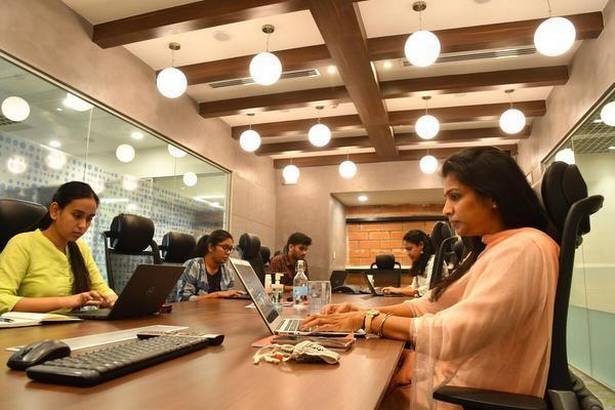
In its first year, WE Hub studied what entrepreneurship meant to different segments of women in Telangana. “There are many misconceptions on what women entrepreneurship is. Most often, it is perceived to be an enterprise creation,” Deepthi says.
Entrepreneurial qualities
The qualities of an aspiring entrepreneur, she explains, is commitment, using innovation to grow business and creating jobs. “We have been able to change the narrative to show women do not just make money but are also job creators. Due to our programmes, we have been able to create blueprints which can be replicated not just in the State but across the country,” she adds.
In the three years since inception, this initiative of the Telangana Government has engaged with 4,527 women entrepreneurs, incubated 148 women-led startups, and supported 276 more. Start-ups are assisted through programmes at three different levels — pre-incubation, incubation and acceleration — connecting them with a mentor pool of professionals from various verticals for one-on-one to group sessions. The expert then provides pointers in terms of strategy, funding, business model and structuring.
The urban/rural areas are conceptualised as ‘Urban Tech’ incubation and ‘Social Impact’ entrepreneurship for tier-2 and tier-3 cities.
Sruthi Niveditha, programme manager of ‘Social Impact’ entrepreneurship, explains that the pilot project ‘Her and Now’ — in collaboration with the German government and funded by German Development Agency (GIZ) — identified over 120 women entrepreneurs across 23 districts of Telangana. She shares that the screening process checks “if the woman is the driving force behind the idea or just a face without any onus”.
During the pandemic, as the programmes went virtual, women were trained to make WhatsApp video calls and use Google Meet interface. “We communicated with them regularly to make them realise that the lockdown is just a passing phase and they should not forget their ultimate identity of being entrepreneurs,” adds Deepthi.
Women with a 51% stake in an enterprise are eligible to incubate at WE Hub. “We are not eliminating men. We believe women should have an equal stake and a decision making power,” says Sruthi, adding, “The vision is to democratise entrepreneurship without this rural/urban divide. If you are an entrepreneur, you are an entrepreneur irrespective of who you are.”
Three women founders incubating at WE Hub speak about their efforts to build the brand
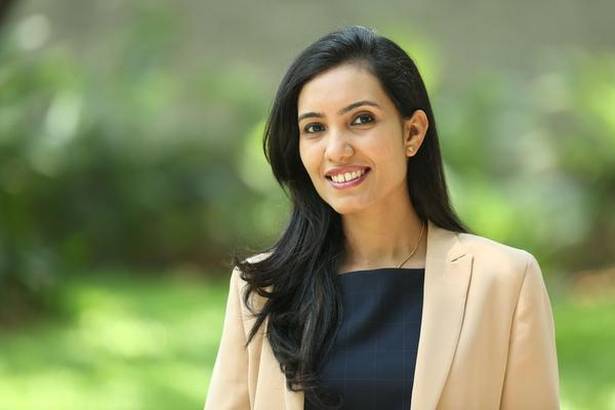
From corporate to medical clothing
From designing ethnic wear, formal officewear and metro rail uniforms to medical clothing, fashion design graduate Shikha Verma Thuetheja is steadily marking her place in the entrepreneurship world. Nagpur-based Shikha got incubated first at IIM, Nagpur by IIM- Bengaluru (2019). “I was among the 100 aspiring women entrepreneurs selected from 6000 women across the country, that gave me the confidence and validation,” she shares.
She started her second office in Hyderabad and hoping for guidance on expansion plans, she got incubated at WE-Hub in 2020. But the pandemic pushed her Studio S labelto make a transition to medical clothing, to survive. “We got the much needed support, guidance and validation from We Hub for pivoting the business model that was impacted due to COVID-19 and transforming it as per the changing market demands.”
The company made masks (45,000 in number), PPE kits (5000+), personalised doctors’ scrub suits (200+), PPE Coveralls, disposable surgical gowns, face shields and gloves, combining style with utility . “We got orders from smaller clinics too, which helped the business grow,” recalls Shikha who keeps shuttling between Nagpur and Hyderabad.
She set up the brand in 2013 with a ₹ 5 lakh investment and one part of the studio converted into a facility for Studio Uniforms “2019 was all about investing in new machines and setting up a sampling and collaborating unit,” she shares. Showing resilience and adapting to a changing world helped Shikha sail through tough times. On National Entrepreneurs Day (January 21). she was felicitated for collaborating with self-help groups and ensuring tailors earned their daily wages even during lockdown.
Founder of vegan condoms
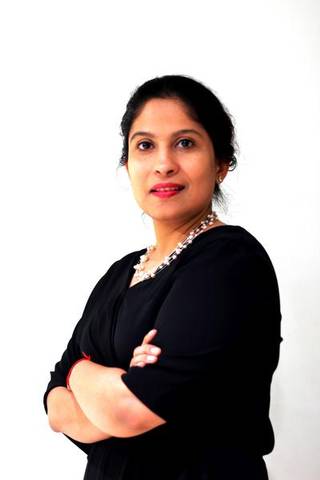
It took two years for Hyderabad-based Komal Baldwa to convince her conservative family about her business idea — setting up a vegan manufacturing unit for condoms. “Personally, I suffered rashes and irritation from regular condoms. I was hesitant initially and took timeto convince my family,” recalls Komal.
In December 2019, she set up Bleu with the USP: ‘Bleu does not contain any harsh chemicals in the lubrication liquid nor carcinogenic agents in the rubber – an unpleasant truth that most condom manufacturers do not reveal.’ The vegan condom that comes with plastic-free packaging is made from sustainably procured latex and is as effective (97.8 %) as other condoms around the world. “Vegan condoms are free from casein and other chemicals. Being a sustainable brand, we want to reduce the use of one time plastic,” she adds.
Says Komal, “It’s easy to start a company, but one is not prepared for a lot of the verticals that come into the picture. Knowing about finances, how to cut costs, which marketing approach to follow or seek information on different loans/subsidies is a big process that needs assistance.” That’s where WE-Hub helped. Reflecting on the one-year journey, Komal says, “We have realised there are many topics that we do not talk about. Bleu as a company would like to create awareness and talk about issues considered taboo in society.” While the product is available online, the bootstrapped company has still not raised funds.
Fashion-based tech
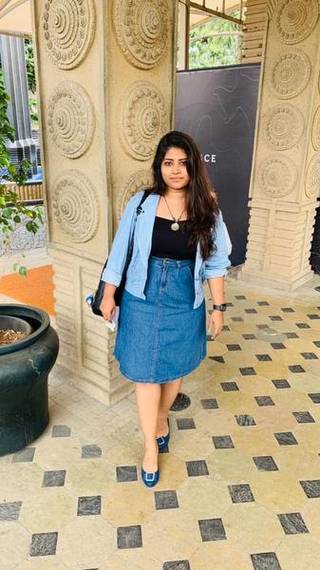
It has been three years since siblings Mouna and Sahith Gummadi launched Hilo Designs. a tech start-up that aimes to bring in personalised fashion experience with a bit of help from Artificial Intelligence (AI).
While Sahith’s experience as a product manager at PayTm came handy in developing the technology, Mouna is a fashion designer and handles the design department. “The idea is to replicate the offline interaction that one has with the designer in an online set up so that one can scale that luxury,” says Sahith.
Mouna feels most of the times we buy brands because a celebrity or fashion blogger has promoted the label. “This AI-enabled model helps in connecting the designer and customer on a virtual platform. Our idea is to democratize the luxury experience so that people get assistance based on their profile and colour preferences at the click of a button,” says Mouna.
Style quiz (profile and preferences), the phase one of tech space to understand the customer’s profile and preferences is currently on. (Once the data points are collected, the in-house expert designers connect with clients to customise and recommend style options.
The AI-based style explorer, that the team is developing analyses the style quiz to give its recommendations. “For instance simple style tips like a short person shouldn’t wear a long kurta can be imbibed to automate and provide basic AI-based designer assistance,” says Sahith. There is also an option to chat with the designers but the siblings hope the automation will help them scale. “The luxury of designer assistance will be scaled with technology efficiency,” adds Sahith.
Article Credit: thehindu
